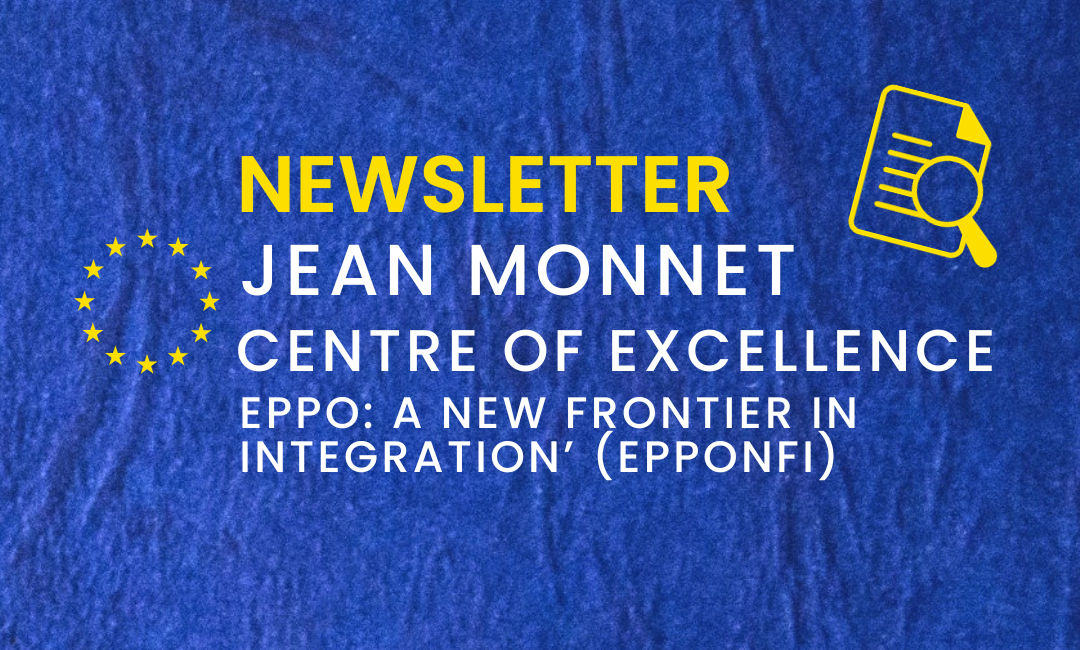Author: Federico Moroni
Committee: Newsletter
Date: 24/05/2024
In recent months, I had the pleasure of collaborating on the drafting of the newsletter for the ‘STEPPO’ Center of Excellence, whose main objective is to spread information and conduct in-depth analysis regarding the activities of the European Public Prosecutor’s Office (EPPO).
EPPO is a body of the European Union that became operational in 2021, resulting from an enhanced cooperation procedure among some EU countries, which took shape in Regulation 2017/1939. The body is responsible for prosecuting crimes that harm the financial interests of the EU. However, these two characteristics also pose a fundamental problem: in the eyes of the public opinion, EPPO is a relatively unknown EU body.
It is essential for democratic institutions to enjoy strong popular legitimacy, and the first step to achieve this goal is to ensure that citizens are aware of their existence and activities. A striking example of this is the reputation and the popular support currently enjoyed by the ‘’ direzioni distrettuali antimafia’’ in Italy, thanks primarily to Giovanni Falcone and Paolo Borsellino; in fact, the notoriety of these two judges inevitably reflected onto the institutions they represented.
On one hand, the limited attention of the public opinion towards the European Public Prosecutor’s Office can be attributed to its recent establishment. On the other hand, EPPO’s lack of recognition among citizens lies in the types of crimes it deals with. Carousel frauds, fraud against European funds, money laundering, are examples of the crimes within EPPO’s jurisdiction, crimes that fail to capture public attention mainly due to three elements: they are not violent crimes (even though they are often committed by very violent criminal organizations), they are characterized by a high level of technicality, making them not immediately understandable by the vast majority of the population (even experienced investigators initially struggled to fully understand the mechanisms behind carousel frauds), and finally, being financial crimes, they are fundamentally invisible.
All this results in the media paying very little attention to this new institution, which, thanks mainly to its cross-border territorial competence, is best placed to effectively combat these crimes.
In my opinion, this is where the ‘STEPPO’ project comes into play. Besides hosting many articles and in-depth analyses on its website, it also offers the opportunity for university students, lawyers, officers of the ‘’Guardia di Finanza’’, high school students, and anyone interested, to attend conferences held by distinguished guests (such as writer Roberto Saviano and deputy prosecutor Petr Klement), and to ask them questions. This latter aspect, questions’ one, is very important, as it often translates into a moment of interaction and direct confrontation between citizens and members of institutions (many guests are national or uropean prosecutors, EU officials, etc.).
In particular, each guest delves into a specific theme regarding EPPO’s activities; this approach allows those attending the meetings to clearly understand the fundamental characteristics, both from an institutional and operational point of view, of the aforementioned EU body.
Another very important opportunity offered by STEPPO is that, in case interested individuals are unable to attend the meetings, they are recorded and subsequently uploaded to the STEPPO website and made freely available to anyone who wishes to access them.
In this regard, the editorial subcommittee of STEPPO plays a key role, which does, among many activities, the drafting of the newsletter. Indeed, it constitutes the fundamental tool available to the STEPPO project to increasingly spread its activities to an ever-expanding audience over time.
To achieve this goal, the newsletter must be captivating; the main objective is to encourage the audience to delve into the topic discussed by the guest in the conference and read the many articles and in-depth analyses on the website. In order to achieve this result, it is imperative for the text to be concise yet very impactful. The graphics also need to be designed to capture the audience’s attention, accustomed to using social networks.
It can be said that the underlying mechanism is very similar to that of many online newspapers: a catchy title combined with a brief excerpt of the content of the actual article, enticing the reader to subscribe to continue reading, with the difference that access to and consultation of the STEPPO website are completely free.
In conclusion, I reaffirm the importance of the STEPPO project, especially for its informative and awareness-raising activities regarding the importance of the European Public Prosecutor’s Office and consequently, by extension, of the European Union. It is indeed through knowledge and awareness that institutions increase their consensus, which I believe is necessary for the achievement of what should be the ultimate goal of the European Union: the complete political union, through the creation of the United States of Europe.

